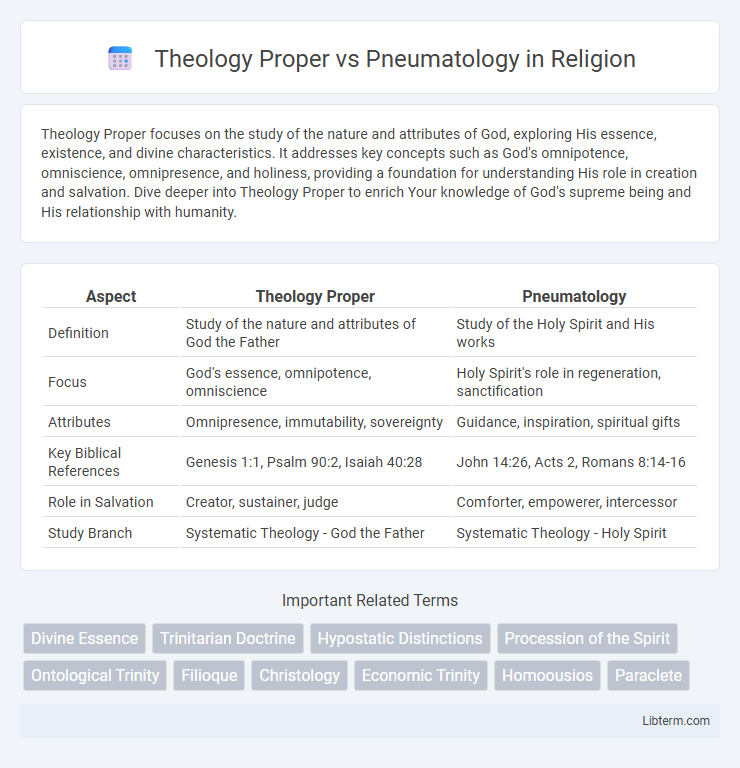Theology Proper focuses on the study of the nature and attributes of God, exploring His essence, existence, and divine characteristics. It addresses key concepts such as God's omnipotence, omniscience, omnipresence, and holiness, providing a foundation for understanding His role in creation and salvation. Dive deeper into Theology Proper to enrich Your knowledge of God's supreme being and His relationship with humanity.
Table of Comparison
| Aspect | Theology Proper | Pneumatology |
|---|---|---|
| Definition | Study of the nature and attributes of God the Father | Study of the Holy Spirit and His works |
| Focus | God's essence, omnipotence, omniscience | Holy Spirit's role in regeneration, sanctification |
| Attributes | Omnipresence, immutability, sovereignty | Guidance, inspiration, spiritual gifts |
| Key Biblical References | Genesis 1:1, Psalm 90:2, Isaiah 40:28 | John 14:26, Acts 2, Romans 8:14-16 |
| Role in Salvation | Creator, sustainer, judge | Comforter, empowerer, intercessor |
| Study Branch | Systematic Theology - God the Father | Systematic Theology - Holy Spirit |
Introduction to Theology Proper and Pneumatology
Theology Proper explores the nature, attributes, and existence of God, focusing on His essence, sovereignty, and relational aspects within the Trinity. Pneumatology specifically studies the Holy Spirit, examining His personhood, roles in inspiration, sanctification, and guidance within the Christian faith. Understanding these foundational branches clarifies the distinct yet interconnected study of God's Triune nature and divine activity.
Definitions: Theology Proper vs Pneumatology
Theology Proper refers to the study of the nature and attributes of God the Father, emphasizing His existence, character, and works as the first person of the Trinity. Pneumatology focuses on the study of the Holy Spirit, examining His personhood, divine attributes, roles in inspiration, sanctification, and empowerment of believers. Both fields are integral to systematic theology, with Theology Proper centering on God the Father and Pneumatology on the third person of the Trinity.
Historical Development of Theological Disciplines
The historical development of Theology Proper traces the systematic study of the nature and attributes of God, prominently evolving through biblical exegesis and church councils from the early Patristic period to Scholasticism. Pneumatology emerged as a distinct discipline in the post-Reformation era, focusing on the person and work of the Holy Spirit, influenced by Pentecostal movements and modern charismatic theology. Both fields reflect evolving doctrinal emphases shaped by ecclesiastical debates, creedal formulations, and shifting paradigms within Christian theological scholarship.
The Doctrine of God the Father (Theology Proper)
Theology Proper centers on the Doctrine of God the Father, emphasizing His attributes as the eternal, self-existent Creator and sovereign ruler of the universe. This discipline explores God's nature, will, and relational role within the Trinity, highlighting His omnipotence, omniscience, and immutability. In contrast, Pneumatology specifically examines the person and work of the Holy Spirit, focusing on His role in inspiration, guidance, and sanctification.
The Doctrine of the Holy Spirit (Pneumatology)
Pneumatology, the study of the Holy Spirit, explores the Spirit's identity, attributes, and work in the life of believers and the church. This doctrine emphasizes the Holy Spirit's role in regeneration, sanctification, and spiritual gifts, distinguishing it from Theology Proper, which focuses primarily on the nature and attributes of God the Father. Understanding Pneumatology is crucial for grasping how the Spirit empowers faith, guides moral transformation, and sustains the community of believers.
Key Differences Between Theology Proper and Pneumatology
Theology Proper focuses on the study of God the Father, encompassing His nature, attributes, and works, while Pneumatology is the branch of theology dedicated to the Holy Spirit, exploring His personhood, activities, and role within the Trinity. Key differences include Theology Proper's emphasis on God's sovereignty, omniscience, and omnipotence contrasted with Pneumatology's focus on the Holy Spirit's functions such as inspiration, guidance, and sanctification. Both fields are essential for understanding the complexity of the Godhead but address distinct persons and theological implications within Christian doctrine.
Theological Interdependence: God the Father and the Holy Spirit
Theology Proper examines the nature and attributes of God the Father, emphasizing His role as the source and authority within the Trinity. Pneumatology focuses on the Holy Spirit, highlighting His functions such as inspiration, sanctification, and divine presence in believers. Theological interdependence reveals how God the Father sends the Holy Spirit to accomplish divine will, demonstrating an intrinsic relational dynamic within the Godhead.
Contemporary Debates in Theology Proper and Pneumatology
Contemporary debates in Theology Proper often revolve around the nature of the Trinity, divine immutability, and the incarnation of Christ, challenging traditional doctrines with open theism and process theology perspectives. Pneumatology discussions focus on the role and personhood of the Holy Spirit, with charismatic movements emphasizing spiritual gifts and ongoing revelation, while cessationists argue for the end of miraculous gifts. These debates impact ecclesiology, soteriology, and Christian praxis by redefining God's interaction with creation and believers in the modern context.
Practical Implications for Faith and Worship
Theology Proper, which studies the nature and attributes of God the Father, influences faith by grounding worship in the understanding of God's sovereignty, holiness, and immutability, shaping prayer, reverence, and doctrinal confession. Pneumatology, focusing on the Holy Spirit's role and work, impacts practical faith through empowerment for service, spiritual gifts, sanctification, and guidance in daily Christian living. Together, these theological disciplines foster a balanced worship experience that honors God's transcendence and immanence, motivating believers towards both awe-filled adoration and active Spirit-led ministry.
Conclusion: Integrating Theology Proper and Pneumatology
Integrating Theology Proper and Pneumatology reveals a comprehensive understanding of the divine nature and the active presence of the Holy Spirit within Christian doctrine. Theology Proper explores the attributes and works of God the Father, Son, and the unified Trinity, while Pneumatology specifically examines the identity, gifts, and role of the Holy Spirit in salvation and sanctification. A holistic theological framework emerges when these disciplines converge, emphasizing the interconnectedness of God's essence and the Spirit's dynamic engagement in the believer's life.
Theology Proper Infographic

 libterm.com
libterm.com